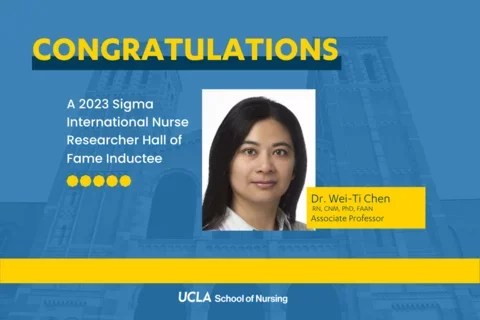UCLA Nursing’s Wei-Ti Chen named to Nurse Researcher Hall of Fame

Wei-Ti Chen, RN, CNM, Ph.D., FAAN, associate professor in the UCLA School of Nursing, has been named a 2023 International Nurse Researcher Hall of Fame inductee by Sigma Theta Tau International Honor Society of Nursing.
Dr. Chen is one of 22 nurse scientists to receive this year’s honor and will be officially inducted during Sigma’s 34th International Nursing Research Congress in Abu Dhabi, United Arab Emirates, in July.
“This recognition is a powerful reminder that the work I am doing is having a positive impact in the U.S. and globally,” Chen said. “As a Taiwanese American, I really see myself and my work as bridge to these cultures and communities while also improving health care outcomes for marginalized populations. I’m so grateful to Sigma Theta Tau for this honor.”
According to a Sigma press release, this year marks the 14th presentation of the prestigious Hall of Fame honor. The 2023 inductees will join 270 previously inducted nurse researchers who have achieved significant and sustained national or international recognition and whose research has improved the profession of nursing and the people it serves.
Dr. Chen has been a researcher for more than two-decades and has more than 100 publications to her name. Her current research focuses on stigma reduction for HIV-positive individuals globally, including Thailand, Myanmar, China, Taiwan, and New York as well as California domestically. She also studies the impacts of stigma in adults with Tourette syndrome.
Much of her early research work focused on immigrant health and breast and cervical cancer prevention, and antiretroviral therapy adherence in people living with HIV. Later, she moved to how parents disclose HIV serostatus to their children. However, after a series of studies, Chen says she repeatedly saw stigma come up as a primary barrier preventing people living with HIV from receiving care and social support. She hopes that by learning more about the factors associated with stigma that we can break down these barriers and better assist those dealing with life-threatening illnesses in clinical settings domestically and globally.



